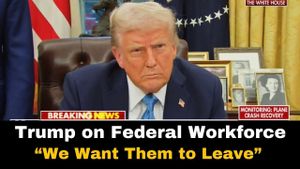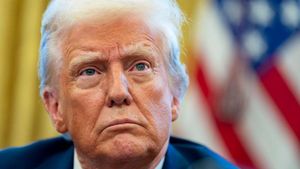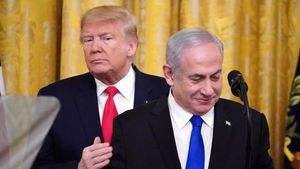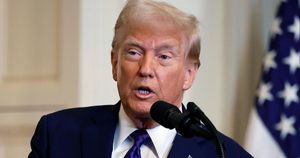Significant changes are underway at the U.S. Agency for International Development (USAID) as the Trump administration implements extensive restructuring and personnel shifts within the agency, which serves as the principal channel for American humanitarian aid. Recent developments have seen two senior security officials placed on administrative leave, reflecting the administration's broader strategy to reshape the agency and possibly integrate it with the State Department.
On Saturday night, John Vorhees, USAID's Director for Security, and his deputy, Brian McGill, were confirmed to have been suspended from their roles. This action follows allegations they denied access to classified materials for personnel from the newly formed Department of Government Efficiency (DOGE), led by prominent entrepreneur Elon Musk. Doge has been thrusting itself fully operational within various government agencies, prompting questions about its influence and intentions.
President Trump, upon returning to Washington from Palm Beach, remarked on the agency's direction, stating, “We’re getting them out,” referencing individuals he described as “a bunch of radical lunatics.” His comments encapsulate the administration's intent to overhaul what many within the current leadership view as ineffective management.
Discussions of USAID's future include potential integration within the State Department. Republican Rep. Brian Mast, who now chairs the House Foreign Affairs Committee, indicated his support for this shift to create more streamlined oversight and control mechanisms for USAID. On CBS’s ‘Face the Nation,’ he claimed, “I would be absolutely for...having it fall under the other parts of the United States Department of State, because of its failure.”
Reports suggest nearly 100 staff members, particularly within USAID's Legislative and Public Affairs bureau, have recently found their email access revoked, illustrating the sweeping personnel changes underway. This contraction leads to concerns about effectiveness within international aid, especially as the agency faces widespread scrutiny and potential dissolution.
Mast also highlighted the importance of security at USAID, asserting the need to purge individuals seen as detrimental to national interests. He articulated this position more forcefully by stating the agency's existing diversity-focused initiatives detracted from pressing diplomatic missions, raising alarms about operating efficiency amid the prevailing political environment.
Efforts to potentially freeze funding for USAID, which currently supports numerous programs globally—from public health initiatives to human rights advocacy—have already drawn criticism. Advocates fear the funding freeze might impact aid programs, affecting efforts like medical support for HIV patients and humanitarian assistance for refugees.
Meanwhile, the appointment of Peter Marocco as head of the Office of Foreign Assistance at the State Department signifies the agency’s shift under Trump's watch. Marocco’s previous experience within the Trump administration leads to speculation about his strategies for overseeing USAID’s transformation.
Recent comments from Trump and various senators indicate the administration's direction brings the agency's future to the forefront of both political and public conversations. Trump has pushed for immediate changes, reportedly exploring executive directives to facilitate USAID’s restructuring.
Elon Musk, though not directly tied to federal operations, has shared sentiments disparaging the agency on social media. His public positions pose questions about outside influences over government operations. He labeled USAID as “a criminal organization” on X (formerly Twitter), without substantiative evidence, which could add to the administration’s narrative surrounding accountability and efficiency.
The culmination of these efforts signifies not just organizational change but also reflects broader political divides and policy directions under current leadership. While there is talk of accountability, the repercussions of losing autonomy for USAID could be steep for many countries reliant on U.S. assistance. Various humanitarian efforts currently face the looming threat of funding cutbacks, and non-profits are wary of the agency's future viability within U.S. foreign policy.
It remains unclear how Congress will navigate this impending restructuring; Mast indicated discussions are deeply underway. Yet the ability of House leadership or the Senate to influence these changes remains ambiguous, especially if Trump opts for unilateral action.
Past administrations have faced similar challenges with USAID’s effectiveness and transparency, including criticisms over allocation processes and the agency’s interactions abroad. The Trump administration seeks to redefine these frameworks potentially, which could lead to new operational paradigms.
For many observers, the pivotal question of how these changes align with the Trump administration's overarching “America First” policy remains under scrutiny. Early signals suggest military and strategic priorities may be favored over long-term humanitarian commitments.
The stakes grow higher as discussions heat up over integrating USAID with the State Department. Should this subject come to fruition, observers wonder what this would imply for humanitarian agendas traditionally prioritized independently by USAID.
With the agency's website reportedly down since February 1, signs indicating potential operational disbandment amplify uncertainty surrounding USAID's legacy. Its future as America's leading humanitarian aid actor now hangs delicately, caught between strategic military pursuits and philanthropic endeavors.
Calls for transparency grow louder amid promises of reform and restructuring. The outcome of these initiatives—whether they lead to meaningful change—will determine America's role on the global humanitarian stage for years to come.



